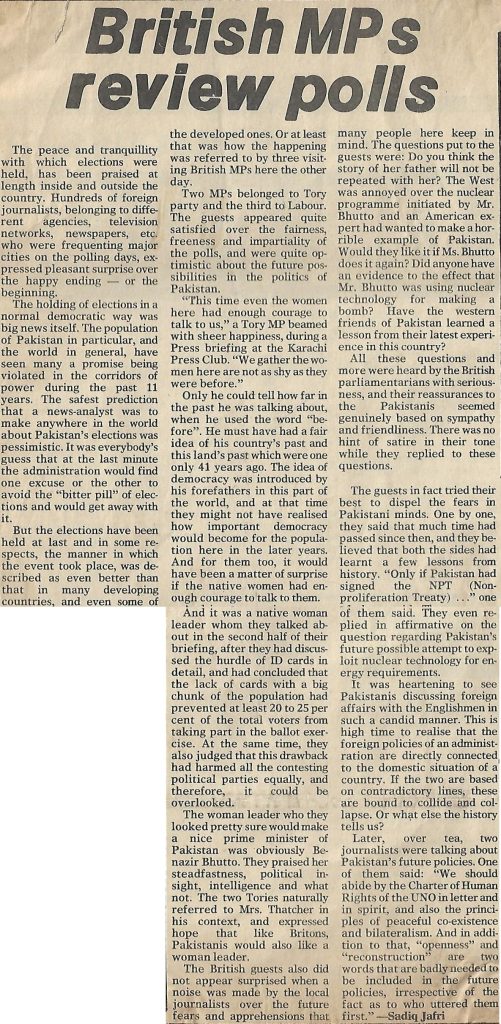Pakistan Times
Nov. 23, 1989
The peace and tranquility with which elections were held, has been praised at length inside and outside the country. Hundreds of foreign journalists, belonging to different agencies, television networks, newspapers, etc. who were frequenting major cities on the polling days, expressed pleasant surprise over the happy ending — or the beginning.
The holding of elections in a normal democratic way was big news itself. The population of Pakistan in particular, and the world in general, have seen many a promise being violated in the corridors of power during the past 11 years. The safest prediction that a news-analyst was to make anywhere in the world about Pakistan’s elections was pessimistic. It was everybody’s guess that at the last minute the administration would find one excuse or the other to avoid the “bitter pill” of elections and would get away with it.
But the elections have been held at last and in some respects, the manner in which the event took place, was described as even better than that in many developing countries, and even some of the developed ones. Or at least that was how the happening was referred to by three visiting British MPs here the other day.
Two MPs belonged to Tory party and the third to Labor. The guests appeared quite satisfied over the fairness, freeness and impartiality of the polls, and were quite optimistic about the future possibilities in the politics of Pakistan.

“This time even the women here had enough courage to talk to us,” a Tory MP beamed with sheer happiness, during a Press briefing at the Karachi Press Club. “We gather the women here are not as shy as they were before.”
Only he could tell how far in the past he was talking about, when he used the word “before”. He must have had a fair idea of his country’s past and this land’s past which were one only 41 years ago. The idea of democracy was introduced by his forefathers in this part of the world, and at that time they might not have realized how important democracy would become for the population here in the later years. And for them too, it would have been a matter of surprise if the native women had enough courage to talk to them.
And it was a native woman leader whom they talked about in the second half of their briefing, after they had discussed the hurdle of ID cards in detail, and had concluded that the lack of cards with a big chunk of the population had prevented at least 20 to 25 per cent of the total voters from taking part in the ballot exercise. At the same time, they also judged that this drawback had harmed all the contesting political parties equally, and therefore, it could be overlooked.
The woman leader who they looked pretty sure would make a nice prime minister of Pakistan was obviously Benazir Bhutto. They praised her steadfastness, political insight, intelligence and what not. The two Tories naturally referred to Mrs. Thatcher in his context, and expressed hope that like Britons, Pakistanis would also like a woman leader.
The British guests also did not appear surprised when a noise was made by the local journalists over the future fears and apprehensions that many people here keep in mind. The questions put to the guests were: Do you think the story of her father will not be repeated with her? The West was annoyed over the nuclear program initiated by Mr. Bhutto and an American expert had wanted to make a horrible example of Pakistan. Would they like it if Ms. Bhutto does it again? Did anyone have evidence to the effect that Mr. Bhutto was using nuclear technology for making a bomb? Have the western friends of Pakistan learned a lesson from their latest experience in this country?
All these questions and more were heard by the British parliamentarians with seriousness, and their reassurances to the Pakistanis seemed genuinely based on sympathy and friendliness. There was no hint of satire in their tone while they replied to these questions.
The guests in fact tried their best to dispel the fears in Pakistani minds. One by one, they said that much time had passed since then, and they believed that both the sides had learnt a few lessons from history. “Only if Pakistan had signed the NPT (Nonproliferation Treaty) …” one of them said. They even replied in affirmative on the question regarding Pakistan’s future possible attempt to exploit nuclear technology for energy requirements.
It was heartening to see Pakistanis discussing foreign affairs with the Englishmen in such a candid manner. This is high time to realize that the foreign policies of an administration are directly connected to the domestic situation of a country. If the two are based on contradictory lines, these are bound to collide and collapse. Or what else the history tells us?
Later, over tea, two journalists were talking about Pakistan’s future policies. One of them said: “We should abide by the Charter of Human Rights of the UNO in letter and in spirit, and also the principles of peaceful co-existence and bilateralism. And in addition to that, “openness” and “reconstruction” are two words that are badly needed to be included in the future policies, irrespective of the fact as to who uttered them first.” —Sadiq Jafri